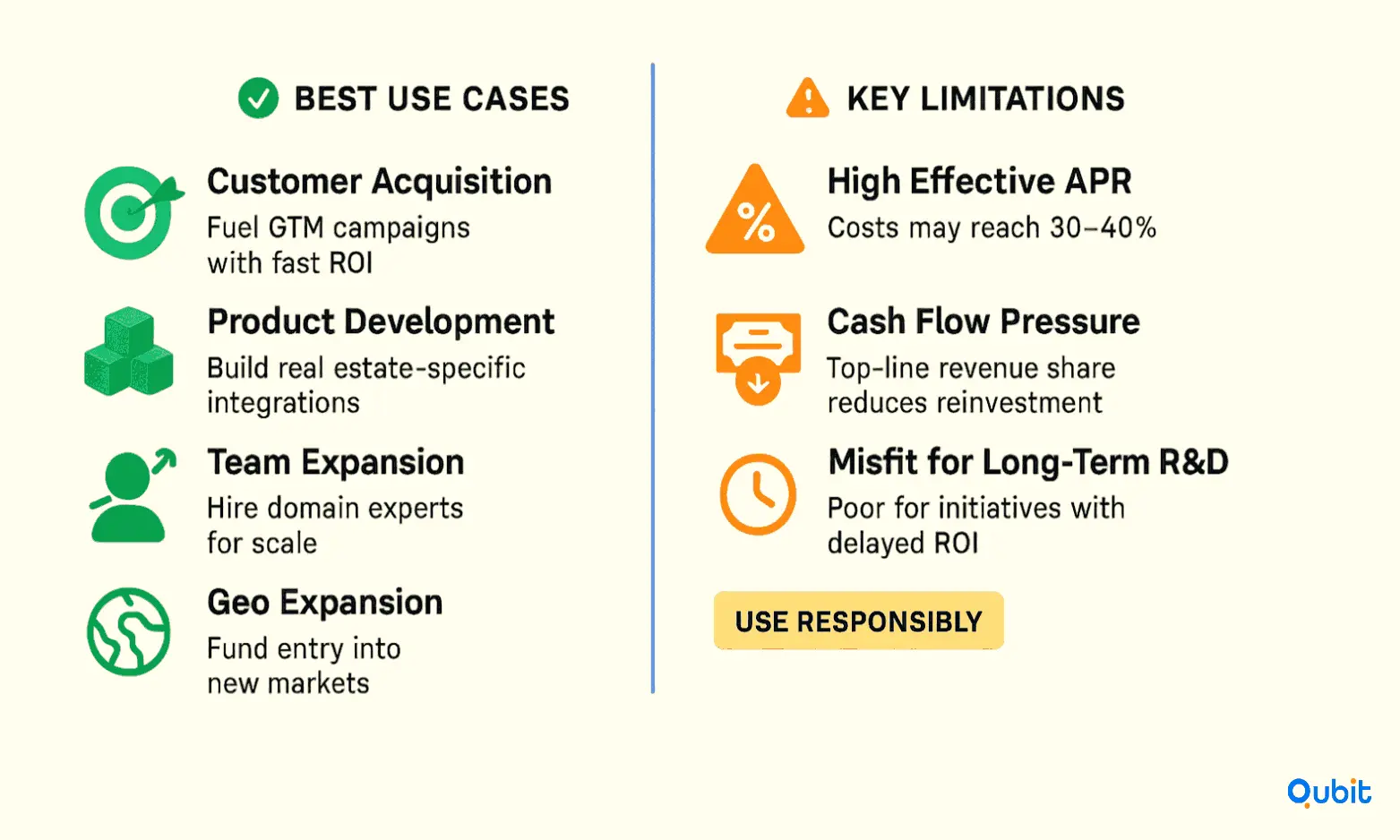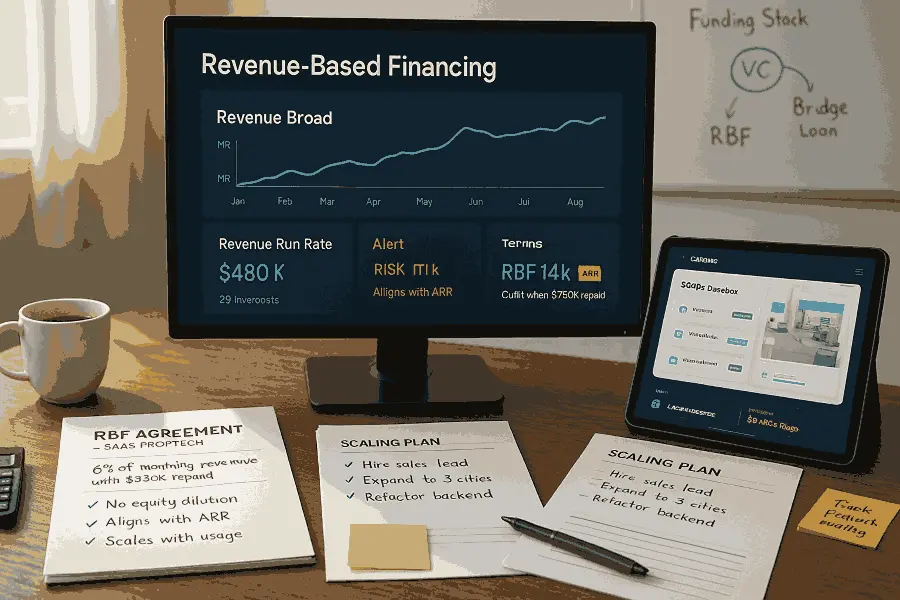The PropTech sector's unique combination of real estate market dynamics and SaaS business models creates an ideal environment for RBF adoption. SaaS startups in particular benefit from this financing model, as their subscription-based business model generates predictable revenue streams. For PropTech companies managing property portfolios, tenant relationships, or real estate transactions, RBF offers the flexibility to scale operations while maintaining founder control and strategic direction.
This comprehensive guide explores how PropTech SaaS companies can leverage revenue-based financing to accelerate growth, the specific advantages it offers over traditional funding methods, and best practices for implementing RBF as part of a broader scaling strategy.
Revenue-Based Financing for SaaS PropTech
Revenue-based financing represents a hybrid between debt and equity financing, specifically designed for businesses with recurring revenue models. RBF involves startups procuring funds from investors in exchange for a predetermined portion of their monthly revenue, complemented by a fixed fee.
How RBF Works for PropTech SaaS
The RBF process for PropTech companies typically follows three key steps:
Step 1: Financial Integration
PropTech companieslink their back-end systems (e.g. Stripe) to the lender to provide transparent access to monthly recurring revenue (MRR), customer metrics, and financial performance data. This integration allows lenders to assess the predictability and growth trajectory of the PropTech platform.
Step 2: Offer Selection
Based on revenue analysis, lenders present funding offers typically ranging from$20,000 to $500,000 with a flat fee, though some providers offer up to $500K–$3M capital infusion for established companies. The funding amount usually represents up to 50% of their ARR.
Step 3: Revenue-Share Repayment
Companiesrepay the advance as a % of your SaaS revenue, typically between 5-20% of total sales until a predetermined cap is reached (commonly 1.4x the original advance). This structure ensures payments scale with cash inflow, less in slower months, more in strong ones.
When equity raises aren’t aligned with your growth arc, exploring proptech alternative funding like revenue-based deals and joint ventures can open more flexible paths.
PropTech-Specific Advantages
PropTech SaaS companies benefit from RBF's alignment with their business model characteristics:
- Predictable Revenue Streams: Property management platforms, tenant portals, and real estate analytics tools generate consistent monthly subscriptions
- Seasonal Flexibility: Real estate markets experience seasonal fluctuations, and RBF payments adjust accordingly
- Customer Retention: PropTech tools often have high switching costs, creating stable customer relationships that support revenue predictability.
Benefits of RBF for Scaling PropTech SaaS

Revenue-based financing offers several compelling advantages specifically relevant to PropTech companies seeking to scale their operations.
Equity Preservation and Control
No equity dilution represents the primary advantage, allowing founders to maintain full ownership and control. This is particularly valuable for PropTech founders who understand their market deeply and want to retain strategic decision-making authority as they navigate complex real estate regulations and market dynamics.
PropTech companies can preserve equity for later-stage funding rounds when valuations may be higher, or maintain independence if they prefer to build a bootstrapped, profitable business. Founders and directors can retain a larger ownership stake in the company and won't necessarily have to worry about giving up control of the company to venture capital firms.
Financial Flexibility
Flexible repayment terms ensure that monthly payments scale in line with revenue, which is crucial for PropTech companies that may experience seasonal variations or market-dependent fluctuations in demand. This flexibility avoids the financial strain of conventional loan payments during lean months.
For PropTech platforms serving commercial real estate, residential property management, or real estate investment markets, this alignment with revenue performance provides breathing room during market downturns while accelerating repayment during growth periods.
Speed and Accessibility
RBF offers faster access to capital with approval and funding often occurring within weeks. Some providers can deliver funding within days, and some RBF firms approve loans in 72 hours. This speed is particularly valuable for PropTech companies that need to capitalize on market opportunities or respond quickly to customer demands.
The streamlined process contrasts sharply with traditional bank loans or SaaS venture capital funding, which can take between three to nine months to close, enabling PropTech companies to maintain momentum in fast-moving real estate technology markets.
Risk Mitigation
No personal guarantees typically required means founders don't put personal assets at risk. This is especially important for PropTech entrepreneurs who may already have significant personal exposure through real estate investments or property ownership.
Aligned incentives ensure that lenders get repaid faster when the company grows, creating a partnership dynamic rather than an adversarial creditor relationship.
Strategic Applications for PropTech Scaling
Revenue-based financing can fund various growth initiatives specifically relevant to PropTech SaaS companies seeking to scale their operations.
Customer Acquisition and Marketing
PropTech companies can use RBF to fund marketing initiatives and CAC-heavy GTM strategies. Real estate technology adoption often requires significant customer education and relationship building, making marketing investment crucial for growth.
Marketing campaigns targeting property managers, real estate agents, or property developers can be expensive but highly effective when properly funded. RBF provides the capital to invest in content marketing, conference participation, and relationship-building activities essential for PropTech success.
Product Development and Feature Enhancement
Product development funding enables PropTech companies to build new features, integrate with additional real estate systems, or expand into adjacent market segments. Real estate technology platforms must continuously evolve to meet changing regulatory requirements and market needs.
Integration development, API enhancements, and mobile application improvements often require significant upfront investment but generate recurring revenue through expanded user engagement and higher subscription tiers.
Team Expansion and Talent Acquisition
Hiring more staff becomes possible through RBF funding, enabling PropTech companies to build specialized teams in areas like real estate compliance, customer success, or technical integration support.
PropTech companies particularly benefit from hiring domain experts who understand real estate markets, regulatory requirements, and customer needs. These hires often command premium salaries but provide essential expertise for scaling in regulated real estate markets.
Geographic and Market Expansion
RBF can fund expansion into new geographic markets or real estate segments. PropTech platforms may need to customize their solutions for different regulatory environments, integrate with local MLS systems, or adapt to regional real estate practices.
Market expansion often requires upfront investment in local partnerships, compliance verification, and market education before generating revenue, making RBF's flexible repayment structure particularly valuable.
Qualification Criteria for PropTech SaaS Companies
Understanding RBF qualification requirements helps PropTech companies assess their readiness and optimize their positioning for funding approval.
Revenue Requirements
Most RBF providers require at least $10,000 in monthly recurring revenue, though many prefer companies with $350K ARR or higher. Some providers focus on companies with $1M+ ARR and 12+ months of recurring revenue.
PropTech companies should demonstrate:
- Consistent MRR growth over multiple months
- Low churn rates indicating product-market fit
- Diversified customer base reducing concentration risk
- Clear unit economics with positive contribution margins
Business Model Characteristics
RBF providers look for subscription-based revenue models with high monthly recurring revenue (MRR) and high gross margins. PropTech SaaS companies are well-positioned if they offer:
- Monthly or annual subscription pricing
- Gross margins between 40–80%
- Predictable customer retention patterns
- Clear upgrade paths and expansion revenue opportunities
Financial Health Indicators
Providers evaluate clean accounting data from platforms like Stripe, QuickBooks, or Chargebee and require:
- 6 months of available revenue data
- Transparent financial reporting
- Reasonable burn rates
- Clear cash flow patterns
Market and Technology Factors
PropTech-specific considerations include:
- Regulatory compliance in target real estate markets
- Integration capabilities with existing real estate technology stacks
- Competitive positioning and differentiation
- Scalability of the underlying technology platform
Leading RBF Providers for PropTech SaaS
Several revenue-based financing providers specialize in or actively serve SaaS companies, including those in the PropTech sector.
Major RBF Platforms
- Capchase focuses on SaaS companies and offers flexible repayment terms aligned with revenue performance. They provide comprehensive financial integration and transparent pricing models.
- Pipe specializes in converting recurring revenue into upfront capital, making them particularly suitable for PropTech platforms with strong subscription metrics.
- FounderPath offers up to 50% of their ARR using RBF and positions itself as an alternative to traditional venture capital for growing SaaS companies.
- Arc provides quick funding decisions and serves as a growth capital source for companies with demonstrated traction and predictable revenue.
For startups managing hardware, infrastructure, or owned properties, proptech venture debt often fills the gap equity alone can't.
Specialized Providers
- Efficient Capital Labs operates a $100M debt facility specifically for SaaS startups and offers expertise in PropTech and real estate technology markets.
- Flow Capital describes RBF as perfect financing structure for high MRR, high gross margin SaaS companies, making them particularly relevant for successful PropTech platforms.
- Lighter Capital serves companies generating $200,000 in ARR or more and specializes in revenue-based financing for technology companies.
Implementation Best Practices
Successfully leveraging RBF for PropTech scaling requires strategic planning and careful execution to maximize benefits while minimizing risks.
Timing and Use of Funds
Ideal timing for RBF includes:
- Post-product-market fit but pre-Series A funding
- During periods of consistent MRR growth
- When specific growth initiatives have proven ROI
- Between equity rounds to extend runway and improve terms
Strategic use of funds should focus on:
- Short-payback initiatives with clear ROI metrics
- Marketing channels with proven conversion rates
- Product improvements that drive customer retention
- Market expansion with validated demand signals
Financial Planning and Management
PropTech companies should:
- Model revenue impact of 5-10% monthly payments on cash flow
- Ensure adequate working capital for operations after RBF payments
- Plan for potential revenue fluctuations in real estate markets
- Maintain detailed metrics tracking to demonstrate continued qualification
Risk Management
Key risk mitigation strategies include:
- Diversifying revenue streams across customer segments
- Maintaining multiple months of operating runway
- Avoiding stacking multiple revenue-share obligations
- Planning for seasonal fluctuations common in real estate markets
Limitations and Considerations
Revenue-based financing includes several limitations that PropTech companies must carefully evaluate before proceeding.
Cost Structure
True cost can be steep with repayment caps that often translate to a 30–40% effective Annual Percentage Rate (APR). PropTech companies must ensure their growth initiatives generate sufficient returns to justify these costs.
The cost-per-month increases significantly if companies repay early, making RBF most suitable for companies with steady, predictable growth rather than those expecting explosive expansion. When traditional VCs overlook niche verticals, these proptech crowdfunding platforms offer access to aligned capital with engaged backers.
Cash Flow Impact
Repayments can erode reinvestment capacity by claiming 5–10% of top-line revenue during a rapid scale phase. This reduction in available cash can limit future growth investments, particularly problematic for PropTech companies that need continuous product development.
Suitable Use Cases
RBF works best for short-ROI projects, making it less suitable for R&D, infrastructure, or enterprise GTM initiatives where returns lag 12+ months. PropTech companies pursuing major platform rebuilds or entering entirely new markets should consider alternative funding sources.
Conclusion
Revenue-based financing represents a compelling funding alternative for PropTech SaaS companies seeking growth capital without equity dilution or lengthy approval processes. The alignment between RBF's revenue-percentage repayment structure and PropTech's subscription-based business models creates natural synergies that benefit both companies and investors.
However, success requires careful planning around the relatively high cost of capital and potential cash flow impact. PropTech companies should focus RBF funding on short-payback initiatives with proven ROI, maintain adequate working capital reserves, and avoid over-leveraging their revenue streams with multiple obligations.
Breaking through the noise isn’t easy, but with our Investor Outreach service you don’t have to go it alone. Explore our approach and see how we help founders get real responses.
Key Takeaways
- RBF provides non-dilutive capital for PropTech SaaS companies with predictable MRR, typically funding 50% of ARR
- Flexible repayment structure aligns with revenue performance, ideal for seasonal real estate market fluctuations
- Qualification requires $10K+ monthly recurring revenue, high gross margins, and clean financial data integration
- Best used for short-payback marketing, product development, and team expansion initiatives with proven ROI
- Major providers include Capchase, Pipe, and FounderPath, with approval timelines as short as 72 hours
- Effective APR ranges 30-40%, making cost-benefit analysis crucial before implementation
Frequently asked Questions
Q: How quickly can PropTech companies access RBF capital?
RBF approval and funding can occur within days to weeks, with some providers offering decisions within 72 hours. This contrasts sharply with traditional bank loans (3-6 months) or venture capital (6-12 months), making RBF particularly valuable for PropTech companies needing to respond quickly to market opportunities or customer demands.






